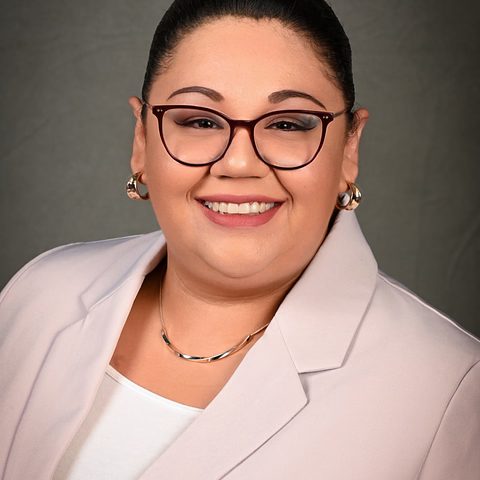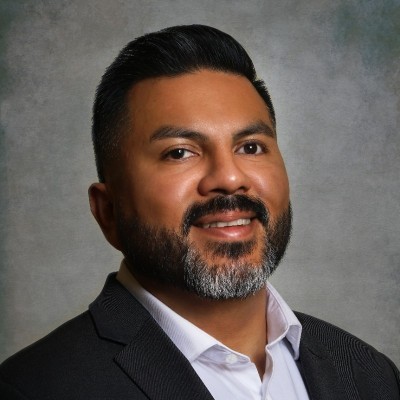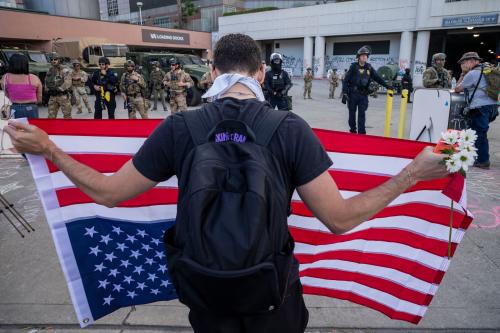Little Village, a Latino business corridor in Chicago, has been contending with tariffs, immigration enforcement, and other changes in federal policy. But business owners have been figuring out new ways to make money, sell their products, and stay open. Tonantzin Carmona, a fellow in Brookings Metro, as well as Chicago civic leaders Luis Gutierrez and Jennifer Aguilar discuss how.
Read Tonantzin Carmona’s research report, “Stabilizing Latino entrepreneurs amid federal policy volatility What states, cities, and civic leaders can do now.”
Watch Tonantzin Carmona’s full interview with Jennifer Aguilar and Luis Gutierrez below, followed by a video version of this podcast episode, and a video of her talking about the research.
Tonantzin Carmona’s full interview with Jennifer Aguilar and Luis Gutierrez.
Video of podcast episode with Tonantzin Carmona.
Tonantzin Carmona talks about her policy research on Latino entreprenuers
Transcript
CARMONA: Obviously at the national level, it would be great if we didn’t have so much volatility. I think the fact that the tariff policy keeps changing is a problem. The immigration enforcement is so intensified. So obviously if that ended, that would be fantastic. We’re not necessarily in that place, right?
[music]
DEWS: Hi, I am Fred Dews, and this is The Current, part of the Brookings Podcast Network. In America, hundreds of thousands of Latino-owned businesses employ millions of people and generate billions of revenue. These businesses are vital to national prosperity but are currently under pressure from what my guest calls “a policy-driven economic crisis.” Tonantzin Carmona, a fellow in Brookings Metro, is author of a new report, “Stabilizing Latino entrepreneurs amid federal policy volatility,” in which she explains why changes in trade, immigration, and federal programs are creating a challenging environment for Latino entrepreneurs and what actions could offer relief.
She joins me now on The Current to discuss her report and to introduce us to a couple of Latino leaders in the Little Village neighborhood of Chicago.
Tonantzin, welcome to The Current.
CARMONA: Thank you so much for having me.
DEWS: So I glossed over the figures in the intro, but can you give our listeners a sense of the scale of the contribution of Latino-owned businesses in the U.S. Economy?
[1:15]
CARMONA: Yes, of course. Latino entrepreneurs are starting and expanding businesses in record numbers. Between 2017 and 2022, Latino-owned employer firms, or those firms that employ at least one person, grew in nearly 90% of U.S. metros. And then in 2022 alone, the figures looked like 465,000 Latino-owned firms employed more than 3.5 million people and generated over $653 billion in revenue. And so their contributions to jobs, to wages, to revenue are incredibly vital to not just local, but also national prosperity.
DEWS: Now you talk in the report about patterns of disruption to Latino entrepreneurship in places like Florida, Texas, and California, including Los Angeles. Can you explain what’s been happening?
[2:06]
CARMONA: Absolutely. So in my report, I basically outline policy-made crises, which are shocks that originate in Washington but ripple through local economies. And we’re sort of seeing a combo of things that are happening. First, it’s tariff volatility. So it’s not just you increase the rate, lower it. It’s the volatility itself of the tariffs that’s creating a lot of uncertainty. But there’s also increased immigration enforcement and changes to federal programs.
And while this is all happening nationally, it’s also rippling through our local economies. And there’s almost inequities, or at least differences, in how it’s showing up in localities. And so you look at a place like Florida, for example, and it’s this aggressive immigration enforcement that is already showing up in local economies and local industries because it’s leading to empty corridors, or changes in agriculture because workers are being impacted, consumers are being impacted. And so it’s really hitting local economies in that way.
But then you look at a place like Texas and it’s tariffs that are impacting them because Texas is a leading trading state. And so you couple that then with increased immigration enforcement and if a business isn’t already feeling it now, they will soon.
And then you turn to places like California where maybe they don’t cooperate with immigration enforcement, but they are still experiencing the impact of that aggressive enforcement. And so what local leaders are doing there is something to watch too, because they’re treating what is happening as an economic emergency. They even had a declaration of of an emergency, which is essentially trying to respond to it at a governmental level. And they’re kind of paving the way for what other local governments can be doing in this moment because in many ways it is a shock. Some are responding, some are not quite there yet, but we need to be paying attention.
DEWS: So your research is national, but it also includes the Windy City, City of Broad Shoulders, the Second City: Chicago. And specifically the Little Village neighborhood there. I’d like to play for listeners part of a conversation you had with two Latino leaders in Little Village. But first, can you describe your connection to that place?
[4:15]
CARMONA: Absolutely. Little Village is a place that is near and dear to my heart. It’s where I was born and raised. I’m very proud of where I come from. I believe it is what has made me. It is a Mexican immigrant neighborhood. And it is filled with residents, neighbors, local entrepreneurs that have inspired me throughout my career because of their resilience and their ability to navigate uncertainty in order to provide futures for their families, for their kids. And right now, it is a place that unfortunately is experiencing many challenges due to aggressive immigration enforcement. And it’s impacting not just residents, but entrepreneurs and business corridors.
DEWS: Can you tell listeners who the two Latino leaders that they’re about to hear from are?
[4:57]
CARMONA: So we had Luis Gutierrez from Latinos Progresando, which is an incredible local nonprofit in the Little Village neighborhood, as well as Jennifer Aguilar of the Little Village Chamber of Commerce. And they both talked about, you know, what they were seeing on the ground, some of the challenges that come from aggressive immigration enforcement. But then also how people are responding in this moment, coming together, collaborating, to really be there for their neighbors and for their local businesses.
[5:27]
GUTIERREZ: What we’re seeing right now is that these small businesses who have been successful and in many of them were ready to expand before all of this happened are starting to scale back. They’re extremely worried about their families. They’re extremely worried about keeping their doors open. They’re extremely worried about protecting their customers. Some of our store owners have started to live in their stores because they can’t afford to rent and they don’t want their businesses to close. So it’s just a really anxious and stressful time for everyone.
[6:02]
AGUILAR: Definitely. I have to agree with Luis. I think right away of one of our business owners that I just talked to. They own a flower shop and they’re seeing the effects of what you call the perfect storm: tariffs, the decrease in foot traffic because of enforcement in the neighborhood. And they basically cannot meet their rent. They cannot anymore. They were telling me a story about how the tariffs has caused them to increase the price of the flowers that they sell, and the decrease in foot traffic basically doesn’t have a lot of people coming in anyway. And when they do come in, they’re like, now I have to pay $50 for a dozen roses because of the tariffs.
It’s just very unsustainable. And they have lost many customers, and they have lost that revenue. So now they’re planning and thinking of ways on how to make that money up.
[7:00]
CARMONA: Latinos Progresando has moved very quickly in this moment, too. You’ve launched a corridor resilience fund to try to get dollars out the door. I’m curious if you can just walk us through how that even came together, why, what gaps you were trying to fill, and what you foresee as maybe some potential outcomes of this work?
[7:19]
GUTIERREZ: Last year, in 2024, we launched a report called “Fuerza Mexicana” with some of our partners. And one of the focuses of that report was economic development. And so something that came out of that report was that there is a brown belt in the city of Chicago. There are 15 majority Mexican neighborhoods across the city. All of those neighborhoods have commercial corridors. All of those neighborhoods have small businesses that pay taxes and support the city.
And so through that work, we reached out to a couple of our partners, particularly partners on the northwest side, Onward Neighborhood House, partners on the southwest side, the Greater Southwest Development Corporation, and talked about what are some of the needs that our small businesses had.
Some of these things we learned through COVID. And so we wanted to make sure that we started to raise money for a fund because we know that as Jennifer and her brilliant idea of marketing the shop local campaigns, it’s great and there are a lot of people not just in our neighborhood, from outside neighborhoods that are coming in using those lists to shop, which is absolutely excellent. But we also know that there’s going to be a gap. Because even with those folks coming in, you don’t know what’s happening on our corridors on a given day. And so people are still very frightened.
And so this fund is really important to help some of the small businesses continue to stay open. And so working with all the partners across the city, we thought it was really important to launched this fund and we’re happy to have launched it. And we’re gearing up now to start deploying some of those funds at the end of the month.
[8:52]
AGUILAR: I think trust is definitely the most important part of the work that we’re doing, especially with this delicate situation. We have to take care of each other. We have to take care of the vulnerable population in our community. And the relationships, that’s a big part of the work that we do. That’s what the Chamber does, is we have those relationships with our business owners. They know that that we’re there to support them. And we’ve started programming in the past years to improve those relationships.
We have a free membership program to encourage businesses to join us, and to really experience what it’s like to be with the Chamber, and and being a member and the benefits of membership. And I think during this time, we’re seeing those benefits and our businesses are seeing those benefits of of being in community, of being connected, of having that support.
Right now we have a person that their full-time job is to be out there stopping by every single business, checking in on them, having conversations. Most of the data that we have is stories. It’s just stories that that the businesses share with us, their concerns, and that’s where we get the ideas for what workshops that we need to do, what trainings do we need to do.
We were one of the first organizations on the corridor to do a Know Your Rights training for businesses. And we did it before the Trump administration even took office, because we knew that that was coming and we got that idea from a business owner who was like, you know, I foresee things are gonna get bad. It would be good if before things get there we’re already doing trainings so that businesses can feel a little bit more prepared, because a lot of them were already bracing for it. But we never imagined how bad it was really going to be.
And that’s why we have done multiple types of training. Basic know your rights, but also getting into the audits, right, of paperwork. Then we’ve also done what is your plan? What’s your action plan? And that’s one of the most popular ones right now because people are seeing that it’s a reality that agents can show up to your business and you need to have a point person assigned. It’s like a fire drill. They need to know what to do. Because during those stressful moments, people forget and they panic. So it’s very important to have a plan.
So that trust that we have built has proved very helpful because our workshops, our trainings are always at capacity. They’re always packed, and we’re adding new ones constantly because people trust us enough to come, receive that information from us.
[11:30]
GUTIERREZ: I’ll just add that, you know, if you look at the small businesses in the City of Chicago and how much they’ve provided for the city, it’s not about skill or want or anything else. It’s about resources. And say, if you are in a position to support small businesses, please do so. If you’re in a position to support the organizations that work directly with these small businesses, please do so. And if you are in a position to advocate, right now is the time that we all need you to stand up and to advocate. This is the moment. So please, take that opportunity to do one of those things. Thank you.
CARMONA: I am just so grateful for both of you, for your time, for sharing your, your thoughts and your perspective, but also for everything that you’re doing in Little Village and for the City of Chicago broadly. Thank you.
DEWS: We’ll have the full interviews that you did with Jennifer and Luis available on our website in the show notes. But could you talk about some of your top takeaways from your conversation with them?
[12:44]
CARMONA: I think what stood out to me was just the … the way that local businesses are being impacted right now, and that is that they’re experiencing extreme challenges. They’re being impacted by immigration enforcement creating this ripple of fear in the community itself that’s impacting not just the business owners, but the workers, their customers. They’re seeing a loss in foot traffic.
Something that they described to me was the similarities between what they saw in the pandemic in regards to the foot traffic and that people are no longer showing up in these business corridors, which are actually incredibly vibrant and important for Chicago’s broader economy. And so now people aren’t showing up. That, if it hasn’t already impacted city budgets, will eventually.
But while there were similarities to the pandemic, they also noted how there were differences in that during the pandemic at least there was a lot more maybe coordination and support, either from local leaders, maybe in the governmental side, maybe philanthropy.
We haven’t arrived there yet. There are models. And there are certainly folks that are paying attention. But I do believe that this is a moment where more can be done. And I’m, I’m very grateful for their own leadership because, you know, on the one hand, they they demonstrated examples of what they’re doing to revitalize the local corridor, such as Luis’s Corridor Fund. And then with Jennifer, just the amazing work that she’s doing in Little Village to respond to entrepreneurs’ needs, but also support other Chambers, organize workshops like Know Your Rights.
And so I think what I took away from that conversation is that yes, there’s incredible challenges right now, but it’s people like Luis and Jennifer and others in the community that are coming together to really respond to their neighbors and needs, but also to support the entrepreneurs that have always supported our local economies.
DEWS: And again, that full conversation is on our website along with your report at Brookings dot edu. But what else can be done at a national policy level to address what you’ve called “a policy-driven economic crisis”?
[14:47]
CARMONA: Obviously at the national level, it would be great if we didn’t have so much volatility. I think the the fact that the tariff policy keeps changing is is a problem. The immigration enforcement is so intensified. So obviously if that ended, that would be fantastic. But we’re not necessarily in that place, right?
And so if you’re, you know, a federal legislator, I think you should be paying attention to what is happening to local economies, use whatever platform you have to really highlight what is happening. Try to connect the dots from a data analysis perspective.
But then if you look at state and local governments or local leaders, this is definitely an avenue where they could be doing more to, you know, stabilize our business corridors through corridor stabilization funds. Another one is capital coordination hubs. How do we get the combo of government, private, philanthropic dollars together and coordinate it so that we can actually get it quickly into our communities?
And in third, and this is probably probably the simplest, is work with local intermediaries, the trusted partners in our communities that can reach entrepreneurs either with information or resources. I think Chambers are a fantastic place to start. But as, you know, our conversation showed there’s also nonprofits that can do a lot in this moment. And private sector philanthropy, there’s also a role for them too in this place, thinking through everything from procurement practices to looking for how they use strategic funds in our corridors.
DEWS: Well you can find the report, “Stabilizing Latino entrepreneurs amid federal policy volatility,” on our website, Brookings dot edu. Tonantzin, thanks again for bringing us this research and sharing the voices from Little Village Chicago.
[music]
CARMONA: Thank you so much for having me.
More information:
- Listen to The Current on Apple, Spotify, YouTube, or wherever you like to get podcasts.
- Learn about other Brookings podcasts from the Brookings Podcast Network.
- Sign up for the podcasts newsletter for occasional updates on featured episodes and new shows.
- Send feedback email to [email protected].
The Brookings Institution is committed to quality, independence, and impact.
We are supported by a diverse array of funders. In line with our values and policies, each Brookings publication represents the sole views of its author(s).









Commentary
PodcastChicago’s Latino business community is adapting in the face of policy volatility
Listen on
The Current Podcast
November 19, 2025